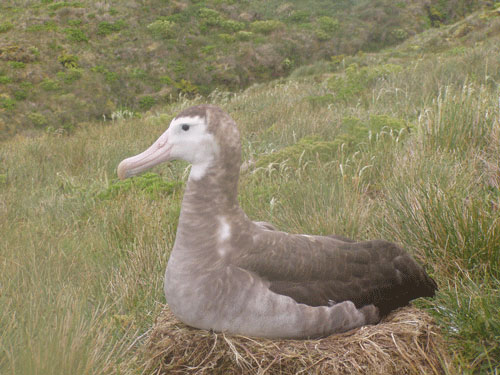A multi-national expedition departs today on the South African Antarctic supply ship, the S.A. Agulhas, from Cape Town to continue conservation research on ACAP-listed species in the United Kingdom's Tristan da Cunha Group.
Nearly three weeks will first be spent on Gough Island, where the 28th year of a demographic study of the Atlantic Yellow-nosed Albatross Thalassarche chlororhynchos will be initiated. Island-wide censuses of Tristan Albatross Diomedea dabbenena chicks and incubating Southern Giant Petrels Macronectes giganteus will also be undertaken. Two field assistants from New Zealand (Graham Parker and Kalinka Rexer-Huber) will be left on the island for a full year: among their work programme will be continuing the Tristan Albatross demographic study of colour-banded birds into its fourth year, as well as undertaking research on the introduced House Mice Mus musculus, required to plan their eventual eradication. These studies are providing information on the extremely low breeding success of several seabirds on the island from predation by the mice. They will also deploy GLS loggers on pre-breeding Tristan Albatrosses as well as on Grey Petrels Procellaria cinerea.

Female Tristan Albatross incubating on Gough. Photograph by John Cooper
Ornithological research on Gough during the September/October relief will be led by Peter Ryan of the University of Cape Town, supported by John Cooper (CORE Initiatives, South Africa) and Rob Ronconi (Dalhousie University, Canada). In addition, Jacob Gonzalez-Solis (University of Barcelona, Spain) will endeavour to retrieve GLS loggers placed on Great Shearwaters Puffinus gravis the previous breeding season.
The expedition then moves to spend roughly two months on Inaccessible Island where Peter and Rob will undertake the third 5-yearly survey of the endemic Spectacled Petrel Procellaria conspicillata, as well as placing satellite trackers on Great Shearwaters, Spectacled Petrels and Sooty Albatrosses Phoebetria fusca in an endeavour to follow both their foraging movements while breeding and then their post-breeding dispersal. The Inaccessible party is due to return to Cape Town on the Baltic Trader in mid December.
Search on "Gough" for earlier stories on the effects of mice on Gough's birds on this web site.
News from John Cooper, ACAP Information Officer and Peter Ryan, FitzPatrick Institute, University of Cape Town, 3 September 2009

 Français
Français  English
English  Español
Español